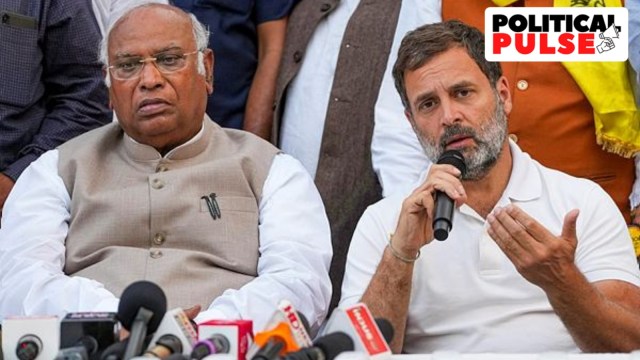In manifesto today, Congress may go silent on OPS, promise to scrap PMLA
The manifesto, to be released by the party on Friday, will also likely promise scrapping of the Prevention of Money Laundering Act, 2002, whose ambit was widened by the Congress-led UPA government and later strengthened by the Narendra Modi-led government through amendments in 2015 and 2019.
 Sources said the Congress manifesto would also refrain from explicitly demanding a return to paper ballot. (PTI)
Sources said the Congress manifesto would also refrain from explicitly demanding a return to paper ballot. (PTI)After making the Old Pension Scheme a strong poll pitch ahead of Assembly polls and actually reverting to it in states where it came to power, the Congress party is learnt to have junked the promise of an OPS for government employees in its manifesto for the Lok Sabha elections.
The manifesto, to be released by the party on Friday, will also likely promise scrapping of the Prevention of Money Laundering Act, 2002, whose ambit was widened by the Congress-led UPA government and later strengthened by the Narendra Modi-led government through amendments in 2015 and 2019. These amendments had given teeth to the Directorate of Enforcement.
Reinstatement of OPS was a key Congress promise in Assembly elections in the recent past, especially, Himachal Pradesh in 2022. In fact, many in the party attributed the Himachal victory to the OPS promise. In fact, the party had re-introduced the OPS in Chhattisgarh and Rajasthan, where it won in 2018; and did so in Himachal too in the very first meeting of the Cabinet chaired by Chief Minister Sukhvinder Sukhu.
When Congress-led UPA was in power in 2009, ‘criminal conspiracy’ under Section 120B of the Indian Penal Code was added to the PMLA’s schedule among various other offences. This has, over the years, allowed the ED to enter any case where a conspiracy is alleged — even if the principal offence is not part of the PMLA schedule. In 2009, the ED also got international jurisdiction as far as tracking laundered money was concerned.
Sources said the Congress manifesto would also refrain from explicitly demanding a return to paper ballot. In 2018, the party had passed a resolution at its AICC session seeking a return to the paper ballot system.
“There are apprehensions among the political parties and the people over the misuse of EVMs to manipulate the outcome contrary to the popular verdict. To ensure the credibility of the electoral process, the Election Commission should revert to the old practice of paper ballot as major democracies have done,” the political resolution passed at the AICC plenary session in 2018 had said.
Sources said the manifesto would still promise a change in the voting process but the stress would be on VVPATs and adoption of the two sources of truth system. The promise, sources said, would be that the party, if voted to power, will ensure that voters will get to verify the VVPAT slips. It is learnt that the party will state that the voter will be given a physical copy of the printed VVPAT slip which after verification can be dropped into a box.
The manifesto would also promise removal of the Angel Tax, first introduced by the UPA government in 2012-13. The manifesto has been prepared by a committee chaired by former Finance Minister P Chidambaram. It will also promise scrutiny of the PM Cares fund and investigation into the electoral bond scheme.
The manifesto would also promise passage of law to cap collection of cess as a percentage of tax revenues. Cess has for long been a bone of contention between the Centre and states since the amount thus collected is not shared with States and used solely by the Union government. Sources said the Congress would promise capping collection of cess at 5 per cent of total tax revenues.
The manifesto would also promise withdrawal of contentious legislations like the Broadcasting Services (Regulation) Bill, 2023 and relook at Digital Personal Data Protection Act. The legislations that the Congress would promise to repeal include The Citizenship (Amendment) Act, The Farmers’ Produce Trade and Commerce (Promotion and Facilitation) Act and the three laws which were enacted by the BJP Government to replace the Indian Penal Code, CrPC and the Evidence Act.
On the “repeal and re-enact with changes” category are the GST Laws on CGST, SGST and IGST, The Right to Information (Amendment) Act, 2019, Environment (Protection) Amendment Rules, 2022, The Criminal Procedure (Identification) Act, 2022, The Forest (Conservation) Amendment Act, 2023, The Telecommunications Act, 2023 and The Chief Election Commissioner and Other Election Commissioners (Appointment, Conditions of Service And Term of Office) Act, 2023,





- 01
- 02
- 03
- 04
- 05


























